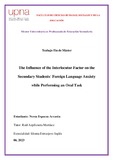Mostrar el registro sencillo del ítem
The influence of the interlocutor factor on the students foreign language anxiety while performing an oral task
| dc.creator | Esparza Arrastia, Nerea | es_ES |
| dc.date.accessioned | 2023-08-09T07:27:03Z | |
| dc.date.available | 2023-08-09T07:27:03Z | |
| dc.date.issued | 2023 | |
| dc.identifier.uri | https://hdl.handle.net/2454/45929 | |
| dc.description.abstract | En las últimas décadas, el estudio de lenguas extranjeras se ha convertido en algo indispensable para cualquier estudiante. Debido a ello, ha aumentado el análisis de la Ansiedad Idiomática. Se trata de un tipo de ansiedad específicamente relacionada con el aprendizaje de lenguas extranjeras (Horwitz et al, 1986). Por lo general, existe una relación negativa entre el aprendizaje de idiomas y la ansiedad lingüística. La Ansiedad Idiomática no sólo afecta a las/os alumnas/os en el aula, sino también en situaciones sociales fuera de ella. A lo largo de este estudio analizamos la influencia que tiene la actitud del interlocutor en la ansiedad que sufre un alumno cuando realiza una actividad oral individual. Para ello, 25 alumnos de 15 años de 4º de Educación Secundaria Obligatoria en España realizaron dos actividades orales, en las que cambió el comportamiento del interlocutor, y rellenaron dos cuestionarios relativos a la ansiedad y a cómo se sintieron durante dichas actividades. Este estudio ha demostrado que, en general, los estudiantes se sintieron más cómodas/os y relajadas/os con un interlocutor más cercano y amigable. Al mismo tiempo, se ha visto que la mayoría de los alumnos sufren ansiedad ante la lengua extranjera cuando realizan una actividad oral. | es_ES |
| dc.description.abstract | Over the last few decades, studying foreign languages has become indispensable for every student. Because of this there has been an increase in the analysis of Foreign Language Anxiety. This is a type of anxiety specifically related to foreign language learning (Horwitz et al, 1986). There is generally a negative relationship between language learning and language anxiety. Foreign Language Anxiety not only affects the students in the classroom but also in social situations outside of it. Throughout this study we will analyse the influence that the attitude of the interlocutor has on the anxiety that a learner suffers when carrying out an individual oral activity. For this purpose, 25 15-year-old students attending 4th of Educación Secundaria Obligatoria in Spain performed two oral activities, in which the interlocutors behaviour changed, and filled in two questionnaires concerning anxiety and how they felt during said activities. This study has shown that, in general, students felt more comfortable and relaxed with a closer and friendlier interlocutor. At the same time, it has been seen that most of the students suffer from Foreign Language Anxiety when performing an oral activity. | en |
| dc.format.mimetype | application/pdf | en |
| dc.language.iso | eng | en |
| dc.subject | Ansiedad Idiomática | es_ES |
| dc.subject | Aprendizaje de idiomas | es_ES |
| dc.subject | Actitud del interlocutor | es_ES |
| dc.subject | Actividad oral | es_ES |
| dc.subject | Adolescentes | es_ES |
| dc.subject | Foreign Language Anxiety | en |
| dc.subject | Language learning | en |
| dc.subject | Interlocutor behaviour | en |
| dc.subject | Oral activity | en |
| dc.subject | Teenagers | en |
| dc.title | The influence of the interlocutor factor on the students foreign language anxiety while performing an oral task | en |
| dc.type | Trabajo Fin de Máster/Master Amaierako Lana | es |
| dc.type | info:eu-repo/semantics/masterThesis | en |
| dc.date.updated | 2023-07-20T12:48:01Z | |
| dc.contributor.affiliation | Facultad de Ciencias Humanas, Sociales y de la Educación | es_ES |
| dc.contributor.affiliation | Giza, Gizarte eta Hezkuntza Zientzien Fakultatea | eu |
| dc.description.degree | Máster Universitario en Profesorado de Educación Secundaria por la Universidad Pública de Navarra | es_ES |
| dc.description.degree | Bigarren Hezkuntzako Irakasletzako Unibertsitate Masterra Nafarroako Unibertsitate Publikoan | eu |
| dc.rights.accessRights | Acceso abierto / Sarbide irekia | es |
| dc.rights.accessRights | info:eu-repo/semantics/openAccess | en |
| dc.contributor.advisorTFE | Azpilicueta Martínez, Raúl | es_ES |


